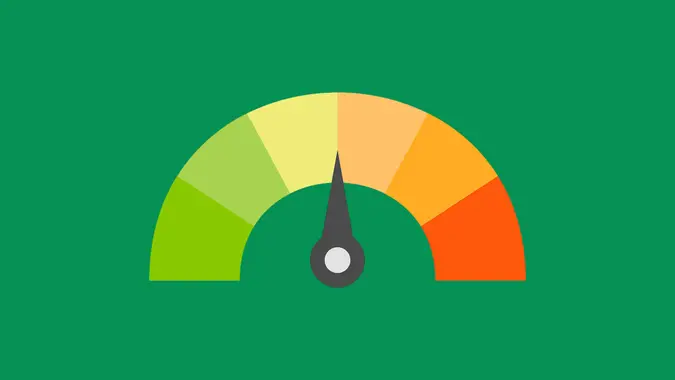How Long Do Hard Inquiries Stay on Your Credit Report?

Commitment to Our Readers
GOBankingRates' editorial team is committed to bringing you unbiased reviews and information. We use data-driven methodologies to evaluate financial products and services - our reviews and ratings are not influenced by advertisers. You can read more about our editorial guidelines and our products and services review methodology.

20 Years
Helping You Live Richer

Reviewed
by Experts

Trusted by
Millions of Readers
If you’ve recently applied for a loan or credit card, you’ve probably noticed something called a “hard inquiry” pop up on your credit report. Maybe you’ve heard that too many of these can hurt your score, and now you’re wondering how long they’ll stick around–and what you can do about it.
You’re not alone. Hard inquiries are a common part of using credit, but they can cause concern if you’re not sure how they work. The good news? Their impact is usually small and temporary. Let’s break it all down.
What Is a Hard Inquiry?
A hard inquiry is when a lender checks your credit report as part of their decision to approve you for a credit card, mortgage, loan, or other financial product. It’s basically the lender’s way of figuring out if you’re a reliable borrower.
Hard inquiries show up on your credit report because they signal that you’re actively seeking credit. This is different from a soft inquiry, which happens when you check your own credit, a lender pre-approves you for an offer, or an employer does a background check. Soft inquiries don’t affect your score–hard inquiries do.
Many people worry that too many hard inquiries will drag down their credit. And while they can have a negative impact, it’s usually not as bad as you might think, especially if you’re managing your credit well in other areas.
How Long Do Hard Inquiries Stay on Your Credit Report?
Hard inquiries typically stay on your credit report for two years from the date they were made. During that time, any lender who pulls your report will be able to see them.
But here’s the important part: their effect on your credit score is usually temporary. Most of the impact happens in the first 12 months. After that, they tend to have little to no effect at all.
Different credit bureaus–Experian, Equifax, and TransUnion–may show the inquiries on your reports in slightly different ways, but the two-year rule generally applies across the board.
Do Hard Inquiries Affect Your Credit Score?
Yes, hard inquiries can lower your credit score–but usually by only a few points. For someone with a strong credit history, the impact might be barely noticeable. However, if you have multiple hard inquiries in a short period of time, it can raise red flags.
Lenders may see multiple recent inquiries as a sign you’re taking on too much debt at once, which can make you look like a risky borrower.
How Long Do Hard Inquiries Affect Your Score?
The biggest impact from a hard inquiry happens within the first 12 months after it’s added to your report. After that, most credit scoring models no longer factor them into your score.
By the time two years have passed, the inquiry automatically falls off your credit report entirely. There’s no need to do anything–credit bureaus remove them for you.
When Do Hard Inquiries Fall Off Your Credit Report?
Hard inquiries automatically drop off your credit report two years after they’re made. You don’t have to contact anyone or take action–they’ll disappear on their own as your report updates.
Over time, these inquiries become less important to lenders and have little to no influence on your creditworthiness.
How to Minimize the Impact of Hard Inquiries
Rate Shopping Without Hurting Your Score
If you’re applying for a mortgage, auto loan, or student loan, rate shopping can result in multiple inquiries. Fortunately, credit scoring models group inquiries for the same type of loan into one inquiry if they happen within a certain time frame–usually between 14 and 45 days, depending on the model.
This means you can shop around for the best rate without worrying about damaging your score.
Avoid Unnecessary Hard Inquiries
One of the simplest ways to protect your credit score is to apply for new credit only when you really need it. Before submitting an application, check if the lender offers a prequalification option. Prequalifying lets you see if you’re likely to be approved without a hard inquiry.
Dispute Unauthorized or Incorrect Inquiries
Mistakes happen, and sometimes unauthorized inquiries show up on your report. That’s why it’s important to review your credit regularly.
If you spot an inquiry you didn’t authorize:
- Contact the credit bureau to dispute it.
- Provide any necessary documentation to support your claim.
- The bureau will investigate and remove the inquiry if it’s found to be inaccurate.
How to Rebuild Credit After Multiple Hard Inquiries
If you’ve had several hard inquiries in a short period and are concerned about your score, there are steps you can take to rebuild and strengthen your credit.
Pay Bills on Time
Your payment history makes up the largest part of your credit score. Even if hard inquiries have knocked you down a few points, consistently paying your bills on time can help improve your score over time.
Lower Credit Utilization
Your credit utilization ratio–how much of your available credit you’re using–also plays a big role in your score. Keeping your credit card balances low (below 30% of your limits, if possible) can make a big difference. In fact, high utilization is often more damaging than a few hard inquiries.
Monitor Your Credit Report Regularly
Checking your credit report regularly helps you spot any inaccuracies and unauthorized inquiries. You can get free reports from AnnualCreditReport.com, and many credit card issuers and financial apps also offer credit monitoring services.
Staying on top of your report helps you catch problems early and shows lenders you’re a responsible borrower.
Daria Uhlig contributed to the reporting for this article.
Our in-house research team and on-site financial experts work together to create content that’s accurate, impartial, and up to date. We fact-check every single statistic, quote and fact using trusted primary resources to make sure the information we provide is correct. You can learn more about GOBankingRates’ processes and standards in our editorial policy.
 Written by
Written by  Edited by
Edited by 






















